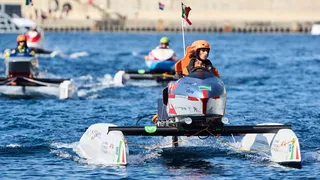The 12th edition of the Monaco Energy Boat Challenge came to a close on Saturday 5 July, capping four days of record-breaking performance, bold innovation and global collaboration in the quest for a cleaner future in yachting. Organised by the Yacht Club de Monaco (YCM), with the backing of the Prince Albert II of Monaco Foundation, UBS, BMW and SBM Offshore, the event has cemented its place as the leading international platform for pioneering sustainable propulsion technologies.
With 42 teams from 20 countries and more than 1,000 students participating, this year’s event was the largest yet. The regatta comprised four technical categories – Energy Class, consisting of standardised hulls testing different technologies; Open Sea Class, CE certified zero-emission prototypes up to 25 metres that can take at least three people; SeaLab Class, floating laboratories which this year focused on pioneering projects using hydrogen.
One of the most exciting new additions this year was the AI Class, a new category for autonomous boats, which wowed spectators with demonstrations of sensor-driven craft capable of docking, manoeuvring and running missions entirely without human input. Derived from drone technology, these systems are already influencing real-world applications.
Technology trialled
Along with AI, key technology was put to the test, most notably innovations in storage of both liquid and solid-state hydrogen, paving the way for more mainstream adoption, and new toroidal propellers which can cut underwater noise pollution by up to 80 per cent. The use of innovative materials was also on display, with teams trialling balsa fibre – a sustainable alternative to carbon and glass composites. "It’s affordable, mechanically efficient and has a limited environmental impact," noted EODev CEO and jury chair Jérémie Lagarrigue.
Speed records broken
In a headline-making performance, Frauscher Boats shattered the standing speed record, clocking 49.84 knots in the Open Sea Class, edging out Vita AX/E (46.28 knots) and Inocel (44.18 knots). The Energy Class also saw notable gains, with Italy’s UniBoAT – University of Bologna Argonauts Team hitting 26.63 knots, up significantly from last year’s best of 20.79 knots.
And that wasn’t their only triumph. UniBoAT dominated the slalom and endurance events, taking home both the Innovation Prize and the Design Prize, and tying for top speed with the Elettra UniGe – Università di Genova team. Their edge came from an ultra-light boat, rigorous pilot training, a highly-manoeuvrable propulsion system and bespoke counter-rotating traction engine, all developed in-house.
Young talent and greening the industry
Now in its 12th year, the Monaco Energy Boat Challenge continues to set a new standard for collaboration and open-source innovation in the marine sector, recognising that there is no time to waste when it comes to greening up the sector. This year’s edition also hosted two major conferences. The Advanced Yachting Technology Conference tackled everything from carbon capture to underwater noise and AI cybersecurity while the 6th Hydrogen & Alternative Fuels Conference, hosted by the Prince Albert II of Monaco Foundation, zeroed in on methanol and dual-fuel solutions for superyachts.
It also continues to be a vital platform for young design talent entering the industry. "What we initially wanted - to connect young people to industry players to accelerate decarbonisation – is becoming a reality," confirmed Lagarrigue.
"This challenge is not just about imagining the future – it’s about building it," added Bernard d’Alessandri, general secretary of the YCM. "Technologies are advancing, the ideas also, now we must speed up. We all have a role to play – it’s time to turn intentions into actions."
Follow the Challenge at energyboatchallenge.com/webtv-mebc.

